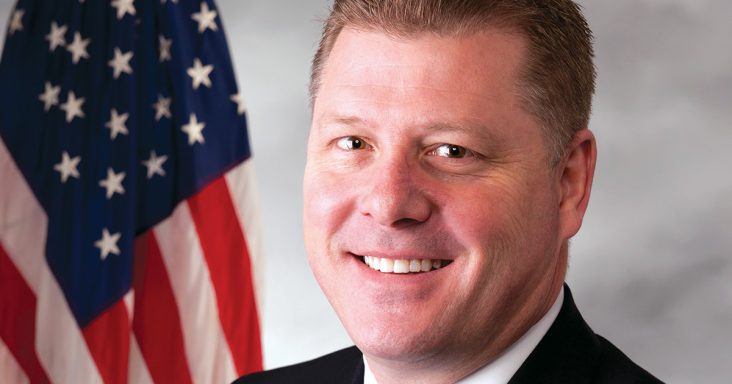U.S. Rep. Rick Crawford on the Farm Bill and foreign trade
by March 14, 2019 8:37 pm 1,022 views

A tumultuous year in farming has included trade and tariff wars, complicated weather conditions, and depressed commodity prices. U.S. Rep. Rick Crawford, R-Jonesboro, notes there has been progress too, ranging from a new Farm Bill to breakthroughs in trade talks to new interest in Cuba.
Crawford recently visited with Talk Business & Politics CEO Roby Brock on a variety of important agricultural issues and what he sees on the horizon.
Roby Brock: Let’s talk a little bit about the Farm Bill. Where do you think it did the most good? Where do you think it might have fallen short?
U.S. Rep. Rick Crawford: I think it did the most good in maintaining continuity. We didn’t create a big change in the program. Generally speaking, that causes a lot of confusion and things like that, so I think that was probably a good thing. And, I think most growers in my neck of the woods are happy with the programs. They probably would have liked to see an increase in reference prices, but with the budget we had to deal with and the dynamics of just getting a Farm Bill passed, it was actually pretty good. We had to hold what we had with regard to reference prices.
Brock: Obviously, trade wars remain a pretty active issue in the ag community. You’ve preached patience to a lot of the farmers in the district. The Wall Street Journal is reporting that farm bankruptcies are at a decades high, that there’s $409 billion in farm debt, levels not seen since the 1980s. How much more patient can farmers be, and are you changing your view on that?
Crawford: I think we’re starting to see some positive developments with China recognizing that they’ve just got to buy U.S. soybeans, so it’s probably hurting them as much or more than it is anybody else for them to try and not do business with the United States. I think the patience should start to pay off here pretty quick. Farmers that I talk to around here in eastern Arkansas are recognizing that this is painful but in the long-term this is necessary, otherwise, we’re going to see China continue to break the rules.
The big illustration of this is not about the steel tariffs, it’s about what drove soybean prices down in the first place, and that is their [China’s] unwillingness to play by the rules with regard to their reporting. What they do is they understate their carryover, soybeans being the commodity in question, and then they overstate their demand. So, farmers get this information and they plant accordingly, and then they come back and revise because they were out of compliance to begin with.
They do that to manipulate the market. They short market before they make their statements, the market goes down, and then they take advantage of the discount and the cash market, so they win on two fronts. We’ve got to get better at calling them out. I think the President has done that. This was all pre-tariffs. The tariffs, yes, exacerbated the problem to some degree, but the problem was there and has been there for quite some time because they don’t play by the rules.
Brock: If the China talks don’t produce major changes, what will you advocate? Are you going to ask for more trade assistance or are there other tools you think that you would advocate?
Crawford: It’s a difficult thing to speculate on. I mean, I have a sense that things are looking pretty bad for China and they are real, real close to coming to terms because they have to. So, I don’t want to speculate on what actions we could take if the deals with China don’t pan out like we’d like to see. There are probably a few tools in the tool shed, they probably ought to leave them there for now until we know when and if it’s going to be necessary to take them out.
Brock: You are advocating potential opportunities with Cuba trade. Tell me where you see expansion opportunities there.
Crawford: This is one of the things I think we got right in the Farm Bill and that was expansion of the market access program and the foreign marketing programs to include Cuba. Now, that’s good. The bad news is we still can’t do credit transactions there, at least for now. We’ve got to get the necessary elements to be able to do that, but we’ve got to get the credit transactions, so that’s been in my bill from the last Congress, HR 2975, to address that. There’s a lot of support for it, but then sometimes Cuba makes it difficult for us. As you might have seen in the recent news, Canadians were subject to some of those sonic attacks that we have heard about. Therefore, they have withdrawn some of their diplomats.
That’s not good for us, and it makes it a little bit of a tougher sell for us in Congress to be able to go to folks and say, “Hey, sponsor this bill so we can sell stuff in Cuba.”
In the end, I want to sell rice, I want to sell soybeans, and I want to sell wheat. I think it’s a great diplomatic tool. I think it’s an important strategic position for us to take because China and Russia are aggressively investing in Cuba and that puts us in a bad position. The best thing I think we can do is turn American farmers loose on Cuba and let’s overwhelm them with capitalism and show them what freedom tastes like.
